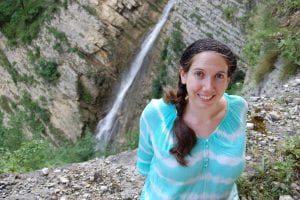David McVey, MAs in Slavic and East European Studies and Geography, Class of 2006
What was your focus or research interest when you studied at OSU?
I graduated from the master’s program at OSU’s Center for Slavic and East European Studies in 2006. I was glad that the center allowed me simultaneously to work toward a second degree in geography. Geography has always been my passion, and geographic thinking has informed the way I approach research and analysis. It’s a frame of mind that provides a novel outlook on any problem. As a pre-MA student, I was even able to publish an article in a peer-reviewed geography journal with the help of the Center’s personnel, Dr. Halina Stephan and Dr. Jason Vuic. I greatly appreciated the Center’s interdisciplinary approach to area studies, which permitted me to chart my own course to a graduate degree.
How has your CSEES MA helped you throughout your post-graduate life?
I value the foundation CSEES helped me lay for my future career, particularly outside academia. The research and writing skills I developed in classes in the program contributed to my success as a contracted immigration assistant for United States Citizenship and Immigration Services at the U.S. Embassy in Moscow. In addition to working as a simultaneous translator for refugee interviews, I served as the primary point of contact for all congressional and legal immigration inquiries. I researched file archives, online databases, and other manuals to collect the materials necessary to respond to often aggressive demands from congresspersons and attorneys concerning their constituents and clients. Owing to the writing guidance that I had received in CSEES courses, I was able to compose expedient, detailed, professional, evidence-based replies and provide accurate, logically presented information to represent my office.
If you are a traveler, what is one of your favorite trips you have taken?
When I was working in Moscow, I took a close friend on a tour of the three Baltic countries: Estonia, Latvia, and Lithuania. He wanted to see something of Russian culture but was hesitant about traveling to Russia proper. Estonia and Latvia have significant Russian-speaking minorities, so we were able to immerse ourselves in a diverse environment of related, yet distinctive cultures, including Russian. We sampled the local cuisines, including zeppelins, gray peas, and pickled herring for breakfast. We filled our cameras with photographs of spectacular architecture, including the particolored doors and gates of old-town Tallinn and the art nouveau facades of central Riga, many of which were designed by Mikhail Eisenstein, father of the renowned Soviet director. We wore out our feet in captivating museums, mesmerized by innovative displays in the Kadriorg Art Museum and immersive, avant-garde exhibits at the Vilnius Contemporary Art Center. We even got to know some locals while we traveled by plane, train, and bus. When our flight from Tallinn to Vilnius was cancelled, an affable business traveler at our gate welcomed us into the frequent-flyer lounge on his account, and we spent a few hours chatting with him. I encourage anyone with a background in Russian to explore this fascinating corner of Eastern Europe, where you will be amazed at every turn, and where your knowledge of Russian will only serve as a bonus.





